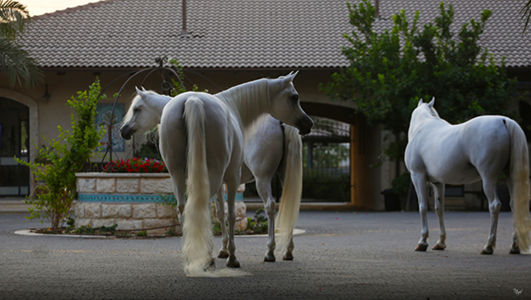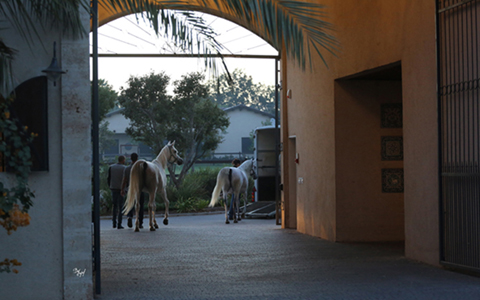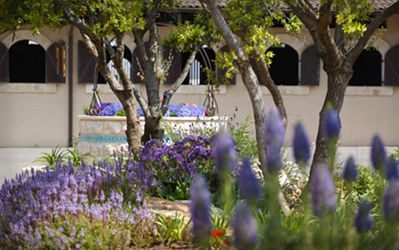
|
In springtime the Jezreel Valley rests nestled like a jewel in the embrace of the surrounding Carmel and Galilean hillsides which are covered with silvery olive and dark green pine trees. Colorful seasonal wildflowers cloak these hills and one can still, as in ancient times, ‘behold the lilies of the field.’ As recorded on the walls of the Egyptian Temple at Karnak some 3500 years ago, horses have been raised in this fertile valley since time immemorial. Although traditionally these horses were raised as instruments for war, today they serve a far more peaceful purpose. The “Jezreel Valley”, or ‘the valley sown by God’, lends itself beautifully to the breeding of fine horses. Each season deep, thick fields of grasses and grains fill the rich black soil. Hot dusty summers, spelled by mild rainy winters, help grow horses of dense bone, strong hooves and unusually sound constitutions. Ariela Arabians has for decades carried on the ancient and noble horse-breeding tradition of the Near East, continuing the practice where the gifting of a horse symbolizes an act of goodwill between allied or disparate peoples. Today Ariela raises some of the world’s most rare and celebrated straight Egyptian and Egyptian-related Arabian horses at their farm in HaYogev. This quiet, cozy village is tucked into the southwest corner of the valley, seemingly under the watchful gaze of ancient Mount Megiddo, the site where the Israelite King Solomon once stabled horses of such excellence that ‘their magnificence knew no precedence.’ 
[“And they found rich good pasture, and the land was wide and quiet, and peaceable.” Chronicles I:1:40 ] 
The farm’s core philosophy is to recognize the intrinsic beauty and special charm of the Arabian horse as a means to bring likeminded horse lovers together, no matter what ethnic, religious or political differences purportedly kept them apart. This vision has been satisfyingly fulfilled, with fine horses bred at Ariela gracing major farms in Israel, throughout the Middle East, and in other farflung corners of the world. The farm has always shared its best horses, and at any time one will find several of Ariela’s homebred horses outside the country, on lease in Europe, America, Africa, or the Near East. From its very beginnings the stud leased the finest Arabian stallions, some more famous than others, to shape and consolidate the look of their own herd. These include the likes of Paris World Champion Imperial Imdal (Ansata Imperial x Dalia), Nader Al Jamal (Ansata Sinan x Savannah CC), and Al Ayad (Moheeb x Al Mamunah), among others.  The heart of their program has always been a superior group of straight Egyptian broodmares; today most of these mares trace back to the recently deceased and legendary black mare, The Vision HG (Thee Desperado x Belle Staar), and the important foundation mares Saniyyah RCA (Mishaal HP x My Shooting Star), Insha Sha Latifa (Ansata Selman x Naffada), and Latifah AA through Imperial Kalatifa. The heart of their program has always been a superior group of straight Egyptian broodmares; today most of these mares trace back to the recently deceased and legendary black mare, The Vision HG (Thee Desperado x Belle Staar), and the important foundation mares Saniyyah RCA (Mishaal HP x My Shooting Star), Insha Sha Latifa (Ansata Selman x Naffada), and Latifah AA through Imperial Kalatifa.
As a result of leasing their own homebred stallions Laheeb (Imperial Imdal x AK Latifa) and Al Maraam (Imperial Imdal x The Vision HG) to the historic state studs of Poland, a few choice Egyptian-related mares descending from important Polish mare families were eventually selected to join the program. Throughout the years Ariela horses have competed with much success on the world stage in numerous prestigious halter competitions. Among the hundreds of awards exhibited in their trophy room are the industry’s most highly coveted award earned by four of the farm’s homebreds — the two stallions Al Lahab (Laheeb x The Vision HG) and Al Ayal AA (Al Ayad x The Vision HG), and the mares Loubna (Imperial Imdal x Imperial Kalatifa) and Badawieh AA (Laheeb x Bahiha), all of which won world championship titles in Paris. Presently the Ariela herd consists of some forty plus Arabians, the vast majority of which are straight Egyptians, that rare and historic subgroup comprising less than 5% of all living purebred Arabians worldwide. Grey remains the favorite and dominant color at the farm, with an occasional individual sporting a differently colored coat. Quality is the benchmark of their success and breeding horses of true and classic Arabian type, the kind that have never ceased to grab the attention of horse lovers over countless centuries, remains the farm’s own standard and its pursuit a never-ending challenge and joy. |



|